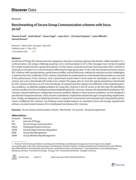New publication in Discover Data! [10.07.24]
Christian Krupitzer from the Department of Food Informatics is Co-Author of the publication "Benchmarking of Secure Group Communication schemes with focus on IoT" in Discover Data.The publication "Benchmarking of Secure Group Communication schemes with focus on IoT" by Thomas Prantl (Julius-Maximilians-University Würzburg, Würzburg, Germany) with the co-authors, André Bauer (University of Chicago, Chicago, USA), Simon Engel (Julius-Maximilians-University Würzburg, Würzburg, Germany), Lukas Horn (Julius-Maximilians-University Würzburg, Würzburg, Germany), Christian Krupitzer (Department of Foodinformatics (150L), and Computational Science Hub (CSH), University of Hohenheim, Stuttgart, Germany), Lukas Iffländer (Julius-Maximilians-University Würzburg, Würzburg, Germany), Samuel Kounev (Julius-Maximilians-University Würzburg, Würzburg, Germany) was published in Discover Data, Springer Nature.
As Internet of Things (IoT) devices become ubiquitous, they face increasing cybersecurity threats. Unlike standard 1-to-1 communication, the unique challenge posed by n-to-n communication in IoT is that messages must not be encrypted for a single recipient but for a group of recipients. For this reason, using Secure Group Communication (SGC) schemes is necessary to encrypt n-to-n communication efficiently for large group sizes. To this end, the literature presents various SGC schemes with varying features, performance profiles, and architectures, making the selection process challenging. A selection from this multitude of SGC schemes should best be made based on a benchmark that provides an overview of the performance of the schemes. Such a benchmark would make it much easier for developers to select an SGC scheme, but such a benchmark still needs to be created. This paper aims to close this gap by presenting a benchmark for SGC schemes that focus on IoT. Since the design of a benchmark first requires the definition of the underlying business problems, we defined suitable problems for using SGC schemes in the IoT sector as the first step. We identified a common problem for the centralized and decentralized/hybrid SGC schemes, whereas the distributed/contributory SGC schemes required defining an independent business problem. Based on these business problems, we first designed a specification-based benchmark, which we then extended to a hybrid benchmark through corresponding implementations. Finally, we deployed our hybrid benchmark in a typical IoT environment and measured and compared the performance of different SGC schemes. Our findings reveal notable impacts on calculation times and storage requirements without a trusted Central Instance (CI) in distributed/contributory SGC schemes.
The publication is available at: doi.org/10.1007/s44248-024-00010-6


